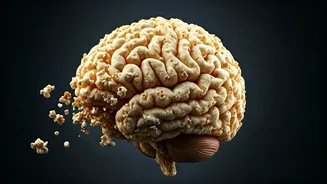Decoding 'Popcorn Brain'
The term 'popcorn brain syndrome' is gaining traction, particularly among young adults. This isn't a formal medical diagnosis but a descriptive phrase
used to capture a specific set of cognitive experiences. It refers to a feeling of mental overload, where the brain jumps rapidly between thoughts, much like popcorn kernels popping in a pan. This constant mental flitting can make it difficult to concentrate, leading to challenges in maintaining focus on a single task or subject for an extended period. The psychologist’s explanation underscores the idea that constant stimulation, such as from smartphones and social media, may be a contributing factor. The resulting effect can be a decline in sustained attention and an increase in impulsivity, making it more challenging to manage tasks requiring focused mental effort.
Digital Age Influence
The always-on nature of modern technology plays a crucial role in the development and prevalence of this syndrome. The constant stream of notifications, updates, and readily available information creates an environment of perpetual stimulation. The brain adapts to this high-speed environment. This constant exposure may cause the brain to become accustomed to rapidly shifting stimuli. The instant gratification provided by apps and other digital content further reinforces the tendency to switch rapidly between tasks. Over time, these habits might shape the neural pathways, potentially leading to a shorter attention span and a heightened propensity for distractions. The psychologist posits that this constant digital input may be a key factor in the emergence of 'popcorn brain syndrome'.
Impacts on Daily Life
The consequences of a ‘popcorn brain’ can be quite widespread, affecting various facets of everyday functioning. Those who experience it may encounter difficulties in their academic or professional lives. They may struggle to complete assignments, attend meetings, or engage in focused work sessions. Relationships can also be negatively impacted, as challenges in maintaining focus may lead to difficulty actively listening during conversations. There could also be issues with impulse control that could result in poor decision-making and difficulties in managing emotions. This can contribute to increased stress levels. The psychologist highlights the need to recognize these patterns and implement strategies to manage the effects of this syndrome.
Strategies for Mitigation
There are several approaches that can be useful to counter the effects of 'popcorn brain syndrome'. The first and most critical step is mindful awareness of the issue. Recognizing the tendency to flit between thoughts is essential. Setting specific periods of time for focused activities, away from digital distractions, can be beneficial. Techniques like the Pomodoro Technique, which involves structured work intervals followed by short breaks, can aid in improving concentration. Practicing mindfulness and meditation can also provide the means to improve focus and attention. Another beneficial practice would be to restrict the usage of social media and other attention-grabbing apps. By actively implementing these strategies, individuals can start to regain control of their mental focus and mitigate the negative consequences of a ‘popcorn brain’.
Seeking Professional Help
While self-help strategies can be effective, it is important to remember that there are times when seeking professional advice is beneficial. If the symptoms of 'popcorn brain' are significantly interfering with daily activities or overall well-being, reaching out to a psychologist or therapist is advisable. A professional can provide a tailored assessment of the individual's challenges. They can offer evidence-based techniques to tackle any underlying issues that are at play. Therapy can equip individuals with coping skills. This helps in managing emotions and improving focus and attention. Remember, mental health is as vital as physical well-being. Getting help from a mental health professional can provide a supportive framework for addressing any concerns related to 'popcorn brain syndrome'.





















